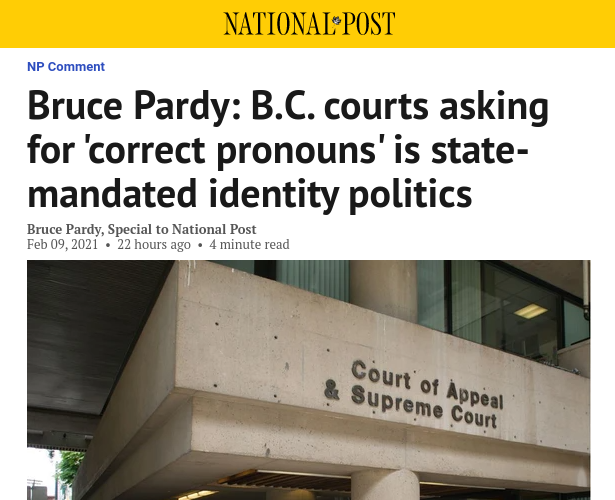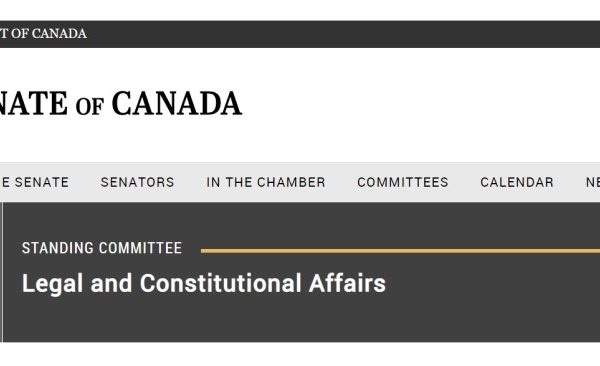This article was first published as an opinion piece in Canadian Lawyer Magazine. The editors removed Ms Farsai’s contribution under pressure from activists rather than encourage a respectful and open dialog on the issues she presents herein. Canadian Gender Report is adamantly opposed to the use of forced and coercive practices that attempt to change how people identify themselves and others. We are honoured to be able to republish Ms Farsai’s opinion piece here.
OPINION 05 Feb 2021
On December 16, 2020, both the BC Supreme and Provincial courts issued practice directions to lawyers that require parties and/or lawyers to state their preferred gender pronouns at the beginning of all court proceedings, which are “to be used” by all participants appearing before the courts including judges.
My antennas naturally went up as a lawyer. I see these practice directions as problematic for three central reasons. They are potentially compelled speech in court, a breach of privacy rights, and damage the perception of judicial impartiality.
Compelled speech
Practice directions do not have the force of law as do formal enactments and court rules, but they express the view of the court regarding matters of practice and procedure. Litigants and practitioners are expected to comply with them or show good reason for doing otherwise. Nevertheless, the directive employs mandatory language that implies that other court participants must employ someone´s preferred pronoun when referring to them in the third person in court. Outside of court, we have legislation to protect gender identity or expression in the BC Human Rights Code, but inside court all parties are protected by absolute privilege or immunity. This doctrine shields the legal process from itself becoming the source of further litigation. No one can dictate the words spoken or written by court participants including judges during judicial proceedings. The doctrine is essential to the administration of justice because it permits parties to give evidence in whatever words they choose and lawyers to protect and present their client´s case unfettered.
The doctrine of absolute immunity goes hand in hand with lawyers’ professional duty to zealously protect their client’s rights. Advocates must not be under any obligation to refer to another party by their preferred pronouns, especially if doing so would go against the legal position and the instructions that they receive from their clients. This point was made in a recent case before the BC Supreme Court. The court heard the case of a mother attempting to prevent her 17-year-old daughter from having surgery to remove her breasts. The daughter wanted to transition to the male gender, and provincial authorities supported her wish. The mother still regarded her daughter as a female. The question of her gender transition was the very issue before the court. Yet when the mother and her counsel referred to the daughter as “her”, the judge challenged the mother´s right to do so. According to the transcript, the judge said, “there has been a request that counsel refer to [the youth] as he or him … are you refusing to do that?”
If a judge asks a lawyer, party or witness to use another’s preferred pronouns in court like that, the request could be misunderstood as a demand — that is, a court order. This would lead to fear of being in contempt of court or being hauled before the law society for conduct unbecoming. What happens if a judge equates malice and insult from pronoun use accurately based on biological sex (as opposed to preferred pronouns) and threatens a charge of contempt?
I turn to a UK example to illustrate the point. In the UK, they have a similar pronoun practice direction. Recently, a complainant of an assault was repeatedly told by a judge to refer to her assailant using the female pronouns, when he was, in fact, a biological male. The judge is reported to have described the complainant´s pronoun infractions as “bad grace” when explaining his reasons for not awarding her financial compensation for the assault (although he could have done so). Sadly, the court compelled her to describe her evidence under oath in a way that hid reality instead of revealing the truth and to add insult to injury she was denied rightful legal compensation. My worry is that such a development could occur in BC given the new directive.
Privacy rights
For privacy rights, not everyone wishes to have their pronouns — and thus their gender identity or expression — announced in public. Asking for pronouns is akin to “outing” someone publicly, conceivably against their will. The question potentially reveals their personal beliefs about themselves, and indirectly perhaps, their sexual orientation. This arguably constitutes a privacy breach. The question is and ought to be irrelevant to the court proceedings.
Judicial impartiality
Finally, preferred gender pronouns are unavoidably controversial and they are not universally accepted. They are part of a larger socio-cultural and legal debate over subjective gender identity versus objective sex — that is, as a biological reality that conforms to scientific evidence. So, when the court shields one type of participant from being offended by the innocent, objective, and correct use of the English language, questions of favouritism inevitably arise.
This point is eloquently put by Judge Stuart Kyle Duncan in United States of America vs. Varner, Court of Appeals for the Fifth Circuit, January 15, 2020 at p. 8-9, “…if a court were to compel the use of particular pronouns at the invitation of litigants, it could raise delicate questions about judicial impartiality…the court may unintentionally convey its tacit approval of the litigant’s underlying legal position. Even this appearance of bias, whether real or not, should be avoided.”
Where truth and courtesy conflict, the court cannot subordinate truth to courtesy. The pursuit of truth is the entire edifice upon which our legal system is built. This practice direction is flirting with compelled speech in court, risking privacy breaches, and exposing itself to accusations of favouring one side in intense socio-political debates.
Related stories
- B.C. courts adopt policy of asking for preferred pronouns to encourage diversity, inclusion
- B.C. Court of Appeal finds Trans teen can seek hormone treatment without parents’ consent
Ms Farsai’s opinion piece and subsequent censorship sparked this response published by the National Post:






This is not a transhpobic article. Did any of the people screaming about how hateful it is actually read it? Her points are valid and I hope B.C. withdraws the practice direction.
I agree with the above comment. This piece was concise and clearly is not hateful or transphobic. I agree that the author’s points are valid and worth consideration. I am a lawyer practicing in BC and agree that the possibility of forcefully outing someone is terrible. Also – since when is anyone’ s gender anyone else’s business? If someone chooses to inform a public courtroom of their gender by requesting to be referred to by a certain pronoun – then that is up to them. Not the Court. If I appeared in Court and was asked by the Court what pronoun I prefer – I would think it was none of anyone’s business! If someone incorrectly referred to me as “Mr” or “he” I would simply correct them. But an announcement for ” the record” is too much to ask of anyone.